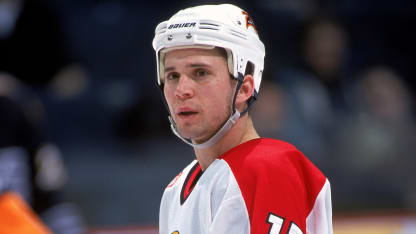"So we said we would pick up the option [one year, $525,000] on St. Louis' contract because it had to be a guy with a contract," Button said.
Button said Tom Watt, who was the Flames' development coach, was the only member of Calgary's hockey operations staff who spoke up on behalf of St. Louis and said he felt he could be an NHL player. It wasn't enough to convince him that St. Louis, at 5-foot-8, could play for Calgary.
He wasn't good enough for the Minnesota Wild or the Columbus Blue Jackets either; neither newcomer selected him in the expansion draft. In turn, the Flames, because they didn't believe enough in St. Louis, bought him out for $175,000, one-third of the contract's value.
St. Louis had to pass through waivers before the buyout was official. He did and become an unrestricted free agent.
"Nobody was clamoring for him," Button said.
Dudley soon started talking to St. Louis' agent, Lewis Gross, about a contract. Dudley remembered watching St. Louis play at the University of Vermont and for Cleveland in the International Hockey League. He remembered being impressed, with one caveat.
"The only bad thing about him was his size, and it's vertical size, not his strength, because he was a powerful kid," Dudley said. "It was only how tall he was."
Dudley wanted a big team because size was important to win in the NHL at that time, but he said he was willing to make an exception for St. Louis. He still had to convince his bosses that St. Louis was worth it.
"There were people, and they were somewhat new to hockey, that couldn't believe that a player who was bought out by one organization could actually play for another organization and be of value," Dudley said. "My boss was Tom Wilson, a very bright guy who was the ultimate boss, and Ron Campbell, who was the president. I had to convince both of them that he could play.
"Eventually, Tom said, 'If Rick feels that strongly about it, then we'll do it.'
But the Lightning clearly weren't 100 percent sold. They left St. Louis exposed for the 2000 NHL Waiver Draft. He was not selected.
"Watching the kid, honestly, I never had a doubt that he'd play for us," Dudley said.



